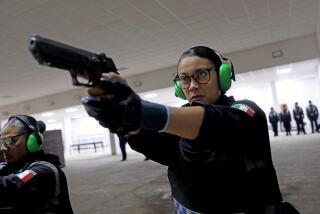Russians See Yeltsin’s New Crime-Buster as a Hopeful Sign
- Share via
MOSCOW — A prison door slammed and a disembodied voice warned, “Bureaucrats, do not take bribes!” Then the popular war hero appeared in army uniform and growled: “I really advise you not to.”
That was the TV ad, during the election campaign. Now the candidate who finished third in Russia’s presidential election Sunday has won a mandate to pursue his law-and-order crusade from an office in the Kremlin, as President Boris N. Yeltsin’s national security advisor.
Retired Gen. Alexander I. Lebed’s appointment Tuesday is largely a bid to help Yeltsin win reelection over the Communist runner-up in Sunday’s first-round vote. But politicians, security experts and voters said it is also the president’s most promising commitment yet to halt a wave of crime and official corruption that has turned Russia into what Yeltsin once called a “mafia superpower.”
Lebed is not the first person or even the first general to take up this challenge, but he is by far the most popular one. Ambition drives him, and his political clout--backed by nearly 11 million votes--will make it harder for any official, Yeltsin included, to stand in his way.
Speaking to reporters after his appointment, Lebed sketched a broad definition of crime in Russia and the powers he intends to wield against it.
“In all civilized countries, crime is confined to criminal business,” he said. “But in our country . . . there is a strange sign at the entrance to the market: ‘Welcome, no admission.’ . . . You cannot start any business without support from the criminal world. The state has surrendered to the criminal world many of its key functions.”
To strike back, he vowed to reequip urban police forces that lack the bulletproof vests, automatic weapons, cellular phones and bugging devices possessed by the mob.
“God created small people and big people, but Colonel Colt invented his revolver to equalize the odds,” he said. “So you start by equalizing the odds.”
But Lebed also insists on trying to reshape social and economic policies that he says feed crime--including policies on unemployment, taxation, reform of the army, privatization of state property and the migration of ethnic Russians from abroad. And he has said he wants Yeltsin to decree a waiver of some rules of evidence to make police less dependent on criminal witnesses in making arrests.
Some Russians reacted to the appointment with apprehension, saying Lebed’s anti-crime efforts might trample on Russians’ newly won civil liberties and property rights.
But the veteran of Russia’s war in Afghanistan insisted Tuesday that he will use “only civilized methods. . . . I want both order and freedom.”
There is also concern, from Russians who applaud him, that Lebed will fail. A 46-year-old ex-paratrooper who left the army last year, he has no detailed anti-crime plan, no team of experts and no experience with the bureaucratic infighting it will take to rally lawmakers and law enforcers to his cause.
“You need very delicate instruments to solve this problem,” warned Konstantin N. Borovoi, a businessman and anti-corruption crusader. “You cannot do it with a sword.”
Said Moscow real estate agent Dmitri N. Sopin: “Lebed was a good soldier, but that doesn’t automatically make him a good cop.”
Although Lebed will have a voice in choosing defense, interior and security ministers, his own job has no constitutional powers. The Security Council, the body he will head, is made up of those and other ministers but is purely advisory.
Left unaddressed at Lebed’s news conference was the problem of corruption pervading the armed services and civilian bureaucracy. If he tries to root it out, he will inevitably clash with Kremlin aides who have enriched themselves under Yeltsin and, eventually, with the president.
“There are certainly enough corrupt officials out there, but the question is, whom is he going to be allowed to go after?” said a senior Western diplomat in Moscow. “He won’t step on the toes of the big boys if it would be unwise to do so, but he can still be pretty successful.
“His plan must be comprehensive to work,” the diplomat added. “I think this is an issue he’s just picked up. I don’t think he has thought it through yet.”
Lebed announced that he will assemble a group of ex-KGB agents and other experts “waiting to serve their country” to help devise a plan within two weeks--before the second round of the presidential election.
If Yeltsin is reelected, it is not clear how long he will need or want Lebed around.
To boost his popularity in the 1991 election, Yeltsin chose another veteran of the war in Afghanistan, Gen. Alexander V. Rutskoi, to be his running mate. As vice president, Rutskoi was put in charge of fighting corruption, then demoted to the agriculture portfolio and eventually jailed for leading an armed revolt.
Lebed, however, stands a better chance of success than Rutskoi, whose ill-planned anti-corruption drive foundered on bureaucratic resistance and Yeltsin’s indifference. Yeltsin could not afford to shunt Lebed aside easily: The former general enjoys far more popular support than Rutskoi ever did and might pose a bigger threat as a critic of crime if Yeltsin didn’t let him fight it.
More to Read
Sign up for Essential California
The most important California stories and recommendations in your inbox every morning.
You may occasionally receive promotional content from the Los Angeles Times.













